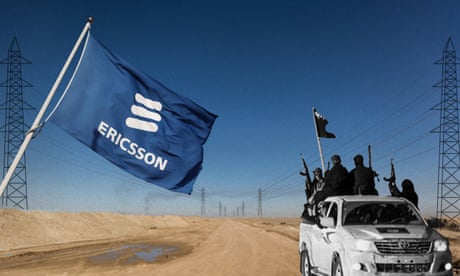- by foxnews
- 08 Apr 2025
Revealed: leaked files show how Ericsson allegedly helped bribe Islamic State
Revealed: leaked files show how Ericsson allegedly helped bribe Islamic State
- by theguardian
- 28 Feb 2022
- in news

Confidential documents have revealed how the telecoms giant Ericsson is alleged to have helped pay bribes to the Islamic State terrorist group in order to continue selling its services after the militants seized control of large parts of Iraq.
The leak of internal investigations at Ericsson, which also found that the firm had put its contractors at risk and allowed them to be kidnapped by the militants, is potentially damaging for the multinational.
In addition to the findings about the alleged payments to IS, the investigations uncovered allegations the company was involved in corruption in at least 10 countries across four continents.
That would suggest a pattern of wrongdoing by Ericsson that is far wider than what the telecoms giant publicly admitted to in 2019, when it entered into a $1bn (£750m) settlement with the US Department of Justice (DoJ).
Ericsson, which is headquartered in Stockholm, employs 100,000 people and sells telecoms equipment in 180 countries. It plays a leading role in developing the next generation of 5G mobile phone technology in the UK.
Since then the telecoms firm has been bracing for the full disclosure of the reports, which were leaked to the International Consortium of Investigative Journalists (ICIJ) which then shared them with media partners including the BBC, the Washington Post and the Guardian.
The leaked documents, running to 101 pages, were produced in 2019 and 2020. They record the results of internal investigations commissioned by Ericsson into alleged corruption by the company around the world.
Investigators concluded that the multinational firm was likely to have been involved in channelling bribes to IS to allow its products to be transported across parts of Iraq that were held by the terrorists.
The payments were made through a slush fund run by contractors working for the Swedish multinational, according to the investigators.
Ericsson pleaded guilty to paying tens of millions of dollars in corrupt payments through slush funds between 2000 and 2016 in the settlement. The admissions related to just five countries: Djibouti, China, Vietnam, Indonesia and Kuwait.
But the leaked documents list evidence of alleged corruption and wrongdoing in a further 10 countries over the past decade.
They chronicle suspicious payments totalling at least $37m in Iraq, along with a range of alleged misconduct such as inflated invoices and paying officials to go on holidays to Spain and Sweden.
In Lebanon, the company allegedly used a slush fund to give gifts, entertainment and hospitality to members of the government between 2010 and 2019. The total size of the slush fund appears to have been as large as $800,000. Bribes were also allegedly paid in Bahrain and Angola.
Ericsson was accused in the documents of being involved in corruption during the award of a contract in South Africa, and acting fraudulently during the acquisition of a company in the US. Other alleged misconduct was identified by the investigators in Brazil, Azerbaijan, Libya and Morocco.
Ericsson and the DoJ declined to comment when asked if evidence of potential wrongdoing in the further 10 countries had been disclosed to US prosecutors before they agreed the terms of the 2019 settlement. The DoJ has the right to launch a new prosecution if it believes that Ericsson had not disclosed all allegations of wrongdoing.
After taking charge of Mosul in 2014, IS controlled about 40% of Iraq, financing the administration of the territory through a mixture of taxes, the sale of oil and looting until it was driven out in 2017.
According to the investigators, Ericsson, which has operated in Iraq for years and sold $1.9bn worth of equipment between 2011 and 2018, received offers from firms that were prepared to transport their infrastructure through Iraq.
The investigators found 18 invoices that had been paid by Ericsson to one of the suppliers to transport equipment, such as mobile phone masts, on trucks through Iraq. The payments were three times higher than the normal cost of hiring these trucks, and for one consignment, it was 20 times the usual cost.
They said there was no evidence that Ericsson employees were directly involved in any payments to IS.
One of the contractors who was kidnapped told Amir Musawy, a reporter working for the Germany TV station NDR, that he had felt pressure from Ericsson and his firm to continue working.
The engineer, who cannot be identified for his own safety, said he was kept under house arrest by IS for a month, during which time Ericsson staff turned off their phones and did not answer his calls for help. He was eventually let go.
- by foxnews
- descember 09, 2016
Ancient settlement reveals remains of 1,800-year-old dog, baffling experts: 'Preserved quite well'
Archaeologists have recently unearthed the remarkably well-preserved remains of a dog from ancient Rome, shedding light on the widespread practice of ritual sacrifice in antiquity.
read more


